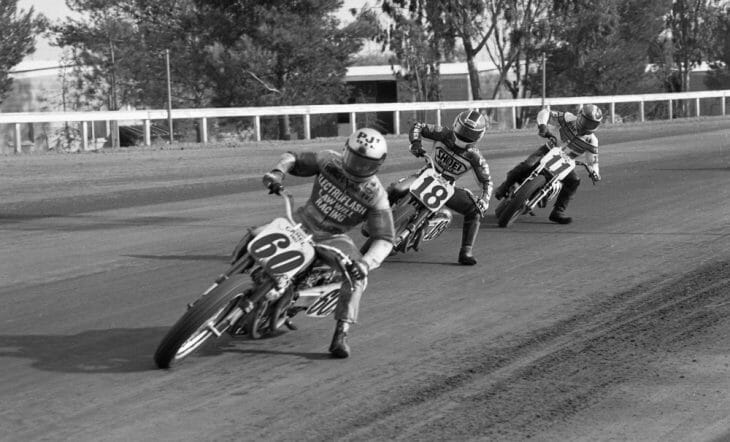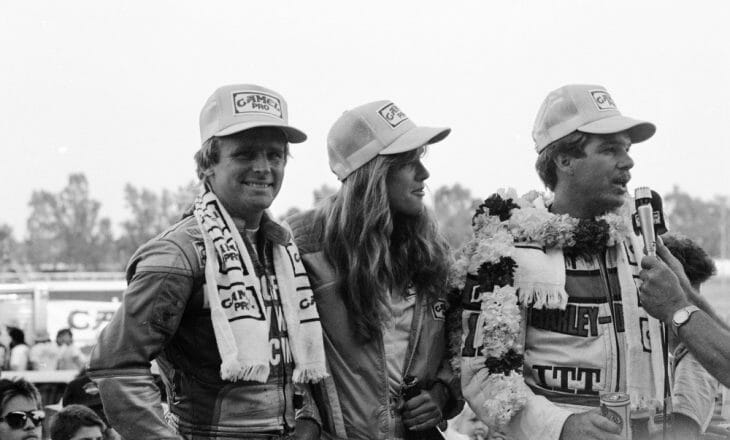Larry Lawrence | November 9, 2016

Photos by Mitch Friedman
Wayne Rainey grew up a flat track racer. He was part of that famous Class of ’79, one of the most talented group of AMA Grand National Flat Track rookies ever, that included great riders like Scott Parker, Ronnie Jones, Charlie Roberts, Tommy Duma, Johnny Wincewicz and Lance Jones. It was only when Kawasaki put him on a factory Superbike it moved him in the direction of road racing, a move which would eventually see him become a three-time Grand Prix World Champion.
Rainey was already an AMA Superbike Champion and had a full season of World Championship 250cc Grand Prix racing under his belt when in 1985 he came back to America to reset his career. Rainey took up an offer to race for the independent MacLean Racing squad to ride Hondas in both the AMA Formula One and 250 Grand Prix Series. Rainey suffered through an injury-plagued season and, despite winning a slew of races in both classes, managed only eighth in the Formula One standings and third in 250 GP.
Since he was in between factory rides at that point, Rainey had the freedom of considering other opportunities. He felt there was some unfinished business in his racing career. Once considered a standout in that excellent 1979 flat track rookie class, for a variety of reasons including uncompetitive machinery and injury, Rainey never fulfilled that promise in flat track racing. It was a hole in his resume and one he badly wanted to fill.
“Growing up I was a dirt track kid,” Rainey explained. “I lived down the road from Ascot Park, I went there every Friday. My dad had riders who were riding his bikes there at Ascot – I mean when I was in school I was drawing dirt trackers during a math quiz.”
While focusing on his road racing career with MacLean, a unique opportunity came up when Kenny Roberts and Mert Lawwill built a special Harley-Davidson XR750 for the Stroh’s Miles. This was a special televised segment of the AMA Grand National Championships, focusing on the Mile events. It was a brilliant made-for-TV series dreamed up by movie maker Peter Starr, with select events televised on ABC’s Wide World of Sports and packaged series showing on The Nashville Network (TNN).
“This was a big deal to have dirt track on TV and Mert wanted to build a bike for the series and asked Kenny to help him,” Rainey recalls. “Mert had some ideas for a pretty special bike with upside-down front forks and a real light chassis and he thought I could develop the bike and then Kenny could ride it at the Springfield Mile. That’s kind of how it all came together.”
So a deal was done that would see Rainey race the Roberts/Lawwill Harley-Davidson at the Stroh’s Miles that didn’t conflict with his road race schedule.
One funny side note was that Rainey was going to have his leathers sponsor make custom leathers for the flat track effort and there was a bit of miscommunication.
“I showed up at the first race and walk up to Mert and he’s got this strange look on his face,” Rainey remembers. “I asked him if I had something on me or something and he said, ‘What is Electroflash Lawwill Racing?’ I told him that’s what he told me to have printed on the front of the leathers and he says, “No, I said Electro “Slash” Lawwill Racing.”
 Even though he didn’t win Wayne Rainey still managed a smile on the podium.
Even though he didn’t win Wayne Rainey still managed a smile on the podium.
Rainey raced the Lawwill-built machine during the summer and he and the crew were quickly developing the bike. Rainey said the bike was better every race. Towards the end of the season Rainey was starting to feel optimistic about his chances of winning a national on the machine.
“It was a rocketship,” Rainey beams. “The fastest bike I ever rode on a Mile.”
An indication of how good the bike was getting came at the San Jose Mile, a couple of weeks before Sacramento, where Rainey finished a solid fifth.
At Sacramento, the season finale in ’85, Rainey turned some heads when he was the fastest rider in time trials. He then went on to win his Heat race as well. Things were looking good for Rainey to possibly win his first Grand National dirt track race.
Tire wear was a big issue at Sacramento that year and there was a lot of discussion on whether to shorten the race or run it in two segments, allowing for a tire change. In the end it was decided that the full 25-lap National would go on as scheduled.
Bubba Shobert, who’d already clinched the national title, led early over Scott Parker, Terry Poovey, Rainey and Alex Jorgensen. Rainey was the first to make a move on Shobert as he took over the lead halfway through the race. In the closing laps a quartet of riders got a gap on the field. It all came down to Rainey, Parker, Jorgensen and Hank Scott on the final lap.
Rainey was leading and trying to figure out on the fly what his strategy was going to be.
“On the white-flag lap I tried to roll out of the throttle going down the back straightaway to see if Parker would go by me,” Rainey explained. “But he’d been in that situation many, many times. So, since he didn’t pass me I cooked it off real hard into three trying to get enough of a gap so that he couldn’t draft past me.
“Coming out of four out onto the front straightaway I could see the checkered flag and I was tucked in and had moved to the inside where the groove stopped and the fluff was. So, I knew If he was passed me it would have to be around the outside. When we came past the checkered flag I honestly thought I’d won the race, but I knew it was very close.”
But the ever-crafty Parker had one more trick up his sleeve, according to Rainey.
“Scotty, knowing there was no start-finish camera and only AMA officials watching, immediately when we crossed the start-finish line he threw up his arm and celebrating like he’d won, so when he came back around after the cool-down lap they gave it to him. I really thought I won, but I wasn’t too upset because I’d just scored my first Grand National dirt tack podium by getting second.”
Even Parker has a big grin whenever he remembers that race, one he calls one of his all-time favorites.
“Beating Wayne by inches, or whatever it was that day, was one of my best wins ever,” Parker said. “If for no other reason than whenever we get together Wayne always says, ‘Scotty, why didn’t you let me win that race?’”